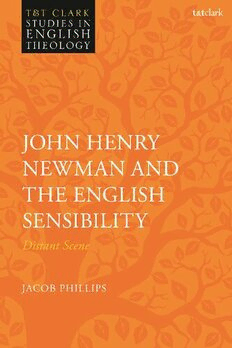
John Henry Newman and the English Sensibility: Distant Scene PDF
147 Pages·2023·9.573 MB·English
Most books are stored in the elastic cloud where traffic is expensive. For this reason, we have a limit on daily download.
Preview John Henry Newman and the English Sensibility: Distant Scene
Description:
John Henry Newman and the English Sensibility scrutinises Newman's theological writings to establish how his theology can be considered distinctively English or un-English at the different stages of its development.Jacob Phillips finds that in Newman's Tractarian period, his theology is profoundly characterised by common 19th-century tropes of a perceived English sensibility, namely an instinct for compromise. In the period following Newman's conversion to Catholicism in 1845, however, this book argues that Newman's mature theology remains unabashedly one-sided in its understanding of God and the Catholic Church, taking precedence over elements of a cultural sensibility pertaining ultimately to the sphere of the natural. The affection for reserve, however, is shown to be capable of gracious elevation when reconfigured on a Catholic grounding. Most importantly, the profoundly empirical orientation to life which was considered typical of Englishness in Newman's day emerges as something exhibiting what Newman might consider a 'antecedent affinity' to Catholic theology.This book thus concludes by offering a view of the English Catholic sensibility as characterised by a mindset of careful reserve toward knowledge and words about God, arising from a marked concern for the living, embodied present as the site of God's transformative action in the twists and turns of human life.
See more
The list of books you might like
Most books are stored in the elastic cloud where traffic is expensive. For this reason, we have a limit on daily download.
